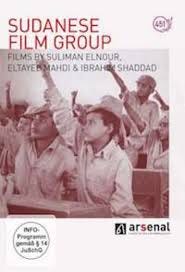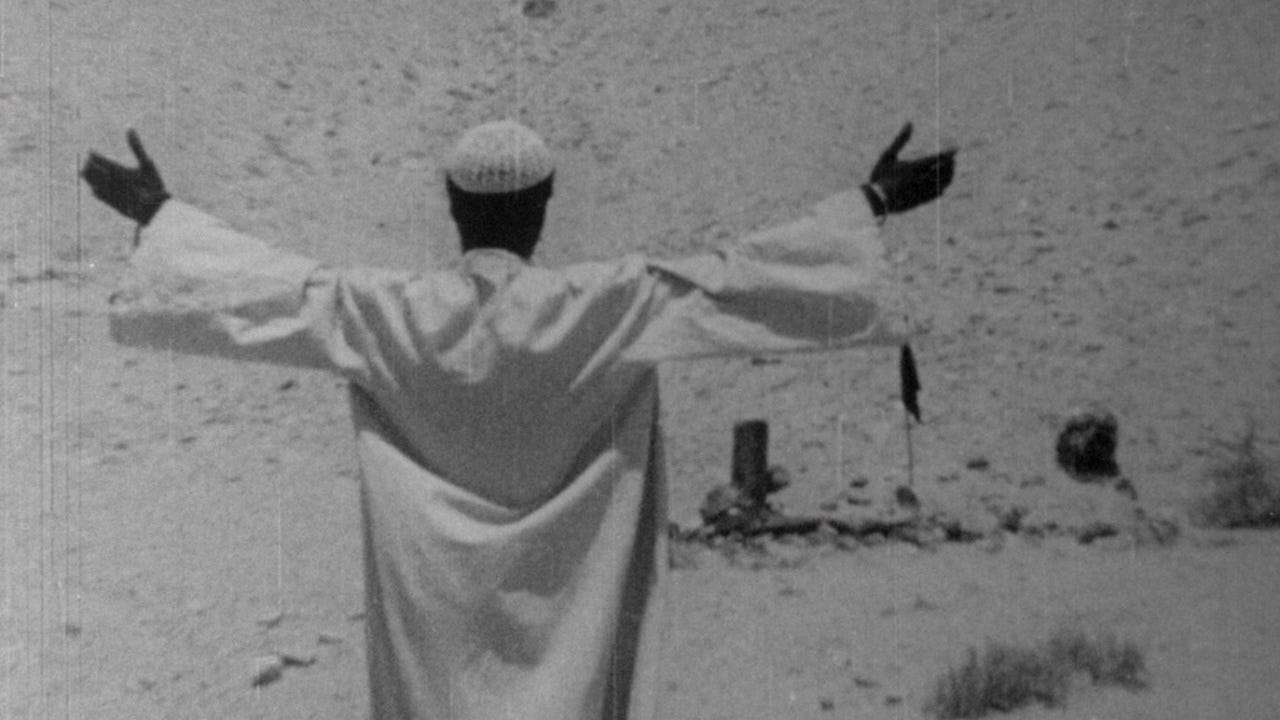My Sudani-American LiFE #14: Ad-Dareeh (1977)
Review of an early Sudanese cinematic classic. Spoilers ahead!
The 70s were something of a golden age for many Sudanese art forms. Now, I say "something" because I quite dislike romanticization of the Nimeiri-era — in many ways, it was worse than what followed it — but there’s no denying the creative flourishing in Sudanese literature, music...and cinema.
Today's movie, ad-Dareeh (literally "the tomb") comes out of this era, being a short film directed by Eltayeb Mahdi of the Sudan Film Group. I first discovered SFG through Suhaib Gasmelbari's incredible documentary, Talking About Trees. While they weren’t the country’s first filmmakers (that honor goes to Gadallah Gubara), they were definitely a pioneering collective who have done a lot of work to promote filmmaking in Sudan. One of these efforts is their “Sudan Film Group” DVD (available on Amazon), which features eight short films directed by members of the collective, along with a booklet containing interviews with the filmmakers and some of the pieces from their “Cinema” magazine, one of the first publications dedicated to cinema in Sudan.
I hope to discuss each and every film on the DVD: while I don’t think any of them are really thrillers, nor do they compare to Renaissance-era Sudanese cinema (2018-onwards, i.e. aKasha and Goodbye Julia), each one offers a fascinating insight into Sudanese film history.
That said, for me, Ad-Dareeh clearly stands head-and-shoulders above the rest. Unlike most Sudanese films from the era, it doesn’t feel directionless, abstract, and mostly focused on image; it is also not what I would call a “culture movie,” in the vein of something like Tajouj or The Wedding of Zein, where the main goal is to film Sudanese traditions for the novelty of it rather than grip audiences with a story or convey a message.
Instead, Ad-Dareeh is a focused and efficient short film about charlatanism. It is one of the sharpest films from this era of Sudanese cinema, sidestepping a comfortable triumphant ending for one that brings us to confront just how strong the will to believe can be, even in the face of contradicting evidence.
Perfectly plotted with a perfect twist
Ad-Dareeh takes place in central Sudan, so 1 point for the Gezira gang (woop woop!), even if the movie was filmed in Egypt (boo). It’s an area of the country long associated with Sufism, so it makes sense for the setting of the story. In the film, a father and son bury a bundle of wheat in anticipation of a forthcoming drought; however, as they’re doing this, a wandering Sufi mystic watches them. As soon as they leave, he begins claiming to passers-by that the buried wheat is, in fact, the tomb of a righteous saint; people quickly get to work on building a shrine around it, where the wandering Sufi begins to perform (purported) miracles, building a cult following. He ends up being quite successful, until the son who buried the wheat discovers the scam and reports it to the police.
Now, in a lesser movie, the son would unbury the wheat, the charlatan’s followers would realize they’ve been scammed, and everybody would fuck off and go home, hopefully with a reminder to themselves to be more skeptical when you meet a random dude in the desert who claims to have healing powers.
But ad-Dareeh does something much more interesting. When the son reveals his intentions to expose the fraud to his father, he finds that his father has 100% bought into the scam, despite having buried the wheat with his own hands. When the police officer announces to the wanderer’s followers about the scam, they don’t turn on the charlatan. Instead, he gives a speech where he stands by the veracity of his miracles, confirmed by the experience of his followers. Then, he leaves — and they follow.
This is an inspired twist that refuses the conception that those who are deceived by Sufi authorities simply don’t know better, and instead raises very interesting questions about faith and confirmation bias. It makes us ask: what is it about this charlatan that allowed him to succeed? If his followers were shown the wheat, would it make any difference to them? How can you combat a deceiver when it seems people don’t merely just believe him, but want to believe him?
While the movie provides no answers, I find the ambiguity of its ending quite pleasing: it leaves the audience surprised and, I find, ready to discuss.
A satire with no jokes?
I struggle to describe the tone of ad-Dareeh. I suppose you could see it as a drama, what with the tension between the audience knowing the scam and the characters eventually discovering it, but it doesn’t really feel like one to me. There’s very little in the way of emotional attachment to the characters, you know what I mean? The most dramatic the movie gets is when the father has an emotional outburst when his son announces he’ll reveal the falsehood of the charlatan, insisting on the power of his miracles; one that reflects his own desperation to be cured from his sickness (for which he has gone to the mystic to do).
At the same time, the term satire doesn’t really feel fitting because…there are no real jokes. The film portrays the gullibility of the charlatan’s victims with no exaggeration or sense that we’re supposed to be laughing at the characters; at the same time, it’s also not showing us harms that make us angry for the characters. The scam artist is not portrayed with any humor, nor does the movie seem to really mock the father for believing. When watching the movie with my sister, there were only two spots where she laughed:
First, when the tea-seller at the shrine repeatedly insists on the truth of the mystic. He uses the same stock phrases again and again, so I do think this is meant to be funny.
Second, when the police officer shows up, takes a quick walk around, and pulls out a cigarette. My sister’s comment: “The most Sudanese man ever. Showed up, did nothing, and started smoking.”
But, it’s not enough for me to get the sense that this is meant to be the main pull of the movie. That said, I do think the movie is satirical in the sense that it creates an exaggerated situation (a shrine being built for a pile of wheat) meant to expose a problem in society, which, I assume, for director Eltayeb Mahdi, is blind, willing faith in Sufi authorities. I found it especially interesting to encounter this movie having seen You Will Die at 20, a movie with a similar theme. To me, this seems to reflect a fixation by bourgeoisie Sudanese on Sufi superstitions, something I also see at a societal level outside cinema; in this way, the film records a changing approach towards Sufism, as more and more educated Sudanese begin to question and ultimately abandon the mystics whose authority once dominated the land.
The visuals
The movie has been restored in black and white, and I find its cinematography simple and effective, although there are no real shots of beauty, like in Eltayeb Mahdi’s other films. The setting is sparse desert with a shrine made of straw; while there are no big sweeping shots emphasizing the expanse, the cinematography still manages to make me feel somehow isolated, like we’re in a place cut off from state power and oversight.
As a side note, I really love the costuming in the movie, which not only represents local dress, but serves as a filmed record of elements of Sudanese fashion that are now rare, i.e. facial scarification (shilookh) and the male tobe (a large piece of cloth crossed over the chest). I love the variety in turban wraps, the incorporation of the curved rural Sudanese cane; it makes for a characteristic representation of a rural, central Sudanese community.
Conclusion
Ad-Dareeh is a compelling, brief story about blind faith that represents an early attempt at socially-conscious Sudanese cinema. While I find it hard to pin down a specific tone or genre for the movie, I think that’s much less important than the fact the movie is fun to watch: we spend the film waiting for the scam to be discovered, only to learn that knowing the truth is different from accepting it. It represents everything I like about Sudanese cinema; it’s self-critical, well-told, challenging, and represents visuals iconic to Sudan. It also resists a one-dimensional narrative in regards to rural Sudanese religiosity, not portraying the Sufi-oriented as innocent simpletons, but people who are driven by deeper cognitive biases. While most other short films from the era are more abstract, Eltayeb Mahdi really stands out for having a movie with a well-structured plot and clear themes that make for enjoyable viewing.
If you haven’t seen it already, check it out! And if you can’t see it: it’s fucking criminal, right? Movies like this really need to be more available.







